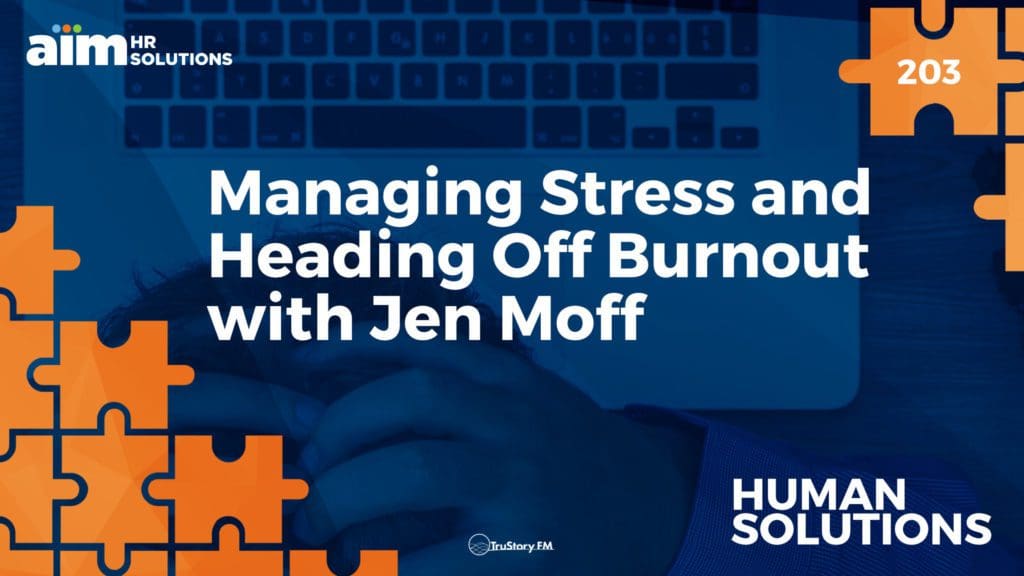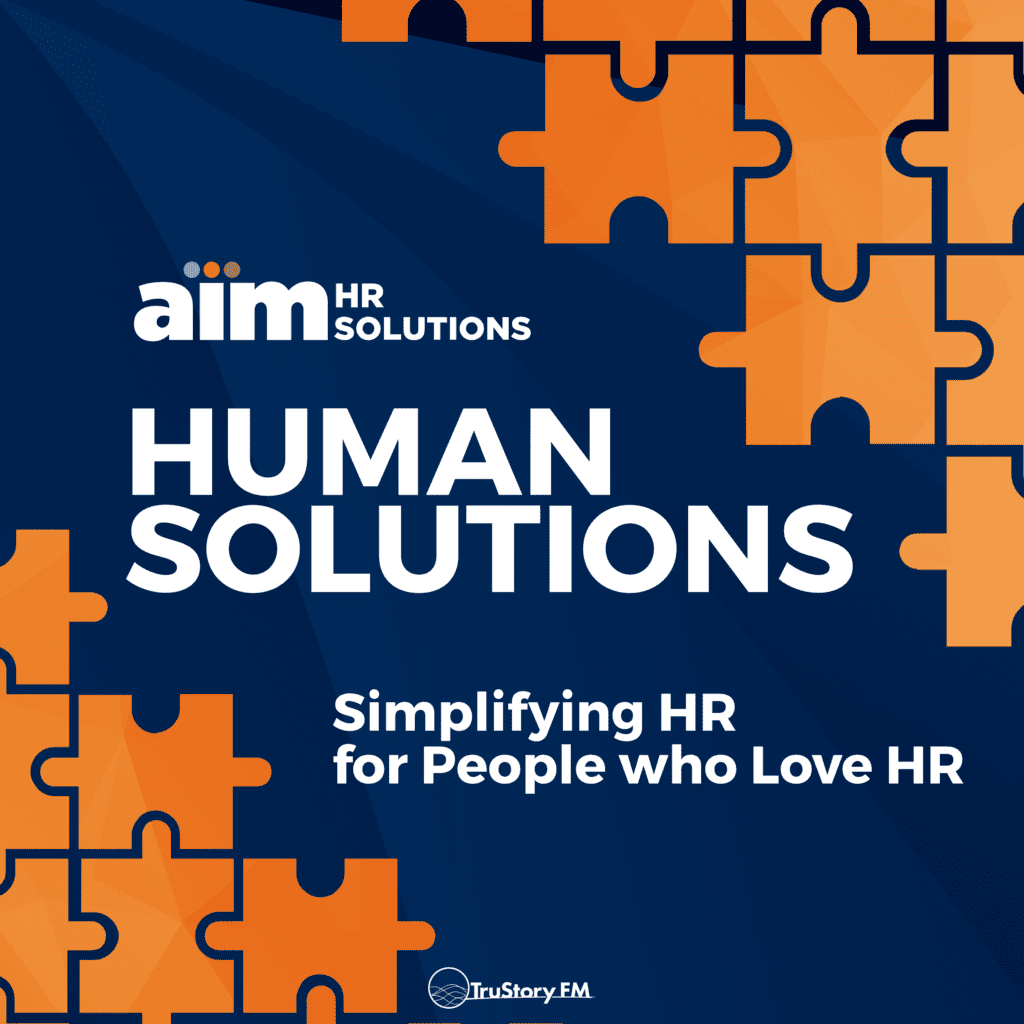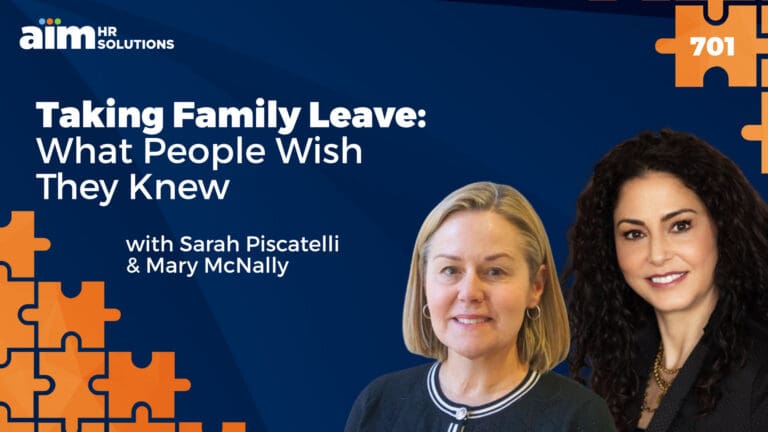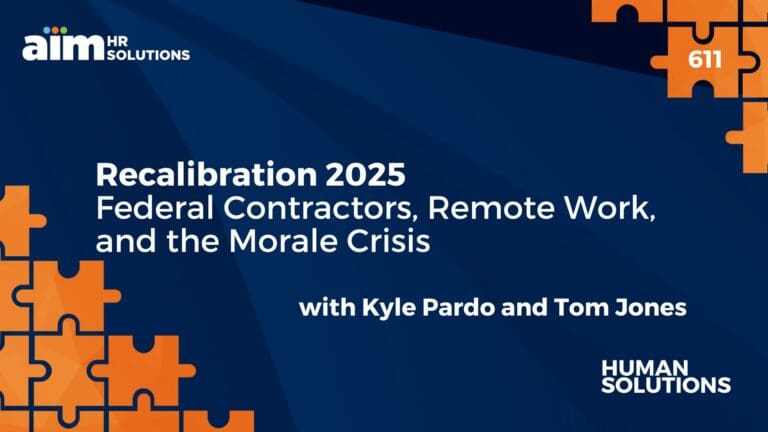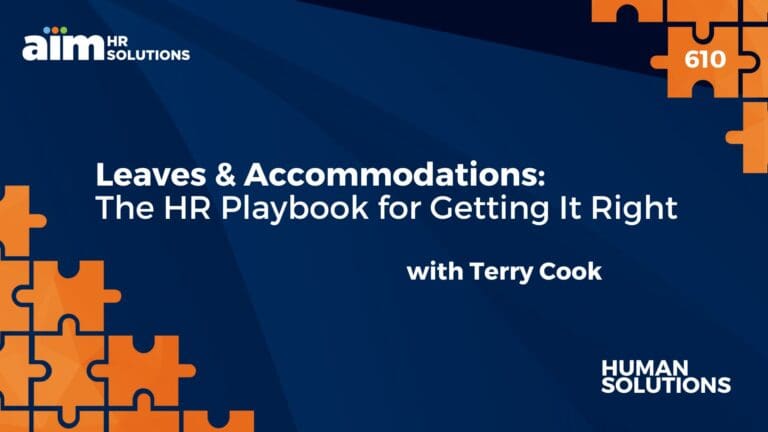Jen Moff, AIM HR VP of Learning & Development, joins Pete Wright to talk about the evolution of mental health in the workplace, the changing expectations of employers and employees about stress at work, and why strengthening the mind muscle might just be next on your exercise plan.
If you’re an HR manager, learning how burnout manifests across your organization is a key skill. But what happens if you spot it? What is your responsibility to help the organization heal, and to help team members see burnout in themselves? Learn the tools and techniques to spot burnout and help your teams manage stress for a healthy, thriving organization!
Episode Transcript
Pete Wright:
Welcome to Human Solutions, simplifying HR for people who love HR from AIM HR Solutions on TruStory FM. I’m Pete Wright, and this week we’re talking all about stress. If there’s any gift to the last two years, it might just be a new sort of relationship between employees and their employers. Today on the show we’re talking about the evolution of mental health in the workplace, the changing expectations of employers and employees about stress at work, and why strengthening the mind muscle might just be next on your exercise plan.
Jen Moff, our VP of Learning and Development, joins me to talk about all that, and shares her favorite tech for relaxing at home, on the road, maybe even at work.
Good morning, Jen Moff.
Jen Moff:
Good morning, Pete.
Pete Wright:
It’s so good to talk to you this fine season two of the show.
Jen Moff:
Yes, it’s so exciting.
Pete Wright:
It’s so exciting. You’re here to talk about stress at work, and I believe you were the one who inspired this conversation. Are you stressed at work, is that the problem? Do we need to have a … Is this an intervention?
Jen Moff:
I’m here to ask for help, Pete. Yes, I did inspire it, not in the way that we’re joshing around about, but this is an area that I adore. Not saying I adore being stressed, but I think it’s such a powerful and important topic that doesn’t get nearly the attention it deserves. So I’m glad to be here talking about it.
Pete Wright:
Yeah, me too. Let’s start with the big B word, shall we, let’s talk about burnout.
Jen Moff:
All right. You said it, burnout. We’ve all been there.
Pete Wright:
Yeah. What is going on with burnout at work right now? Is this the sort of thing that you can trend? Are people more burned out now than they have been in the past?
Jen Moff:
I think what we tend to see with burnout is people don’t realize it’s here until it’s here, because it’s not something we’re educated about on how to identify what the precursors are for it. And so all of a sudden when it starts trending in the zeitgeist, it’s a big topic to discuss.
But I think what we can also notice is it’s always been present. But there’s certain things that are happening currently, or finished happening previously, that have amplified this topic.
Pete Wright:
Should we put a name to those things? Are we talking-
Jen Moff:
All right. If you’re ready, I will.
Pete Wright:
I’m ready.
Jen Moff:
I think the pandemic did a little number on us.
Pete Wright:
Yeah. Yeah, I think it did. And I think that to me is the central question to how we’re dealing with burnout and how our relationship with burnout has changed.
Jen Moff:
Totally.
Pete Wright:
Because our relationship with work has changed.
Jen Moff:
Oh yes.
Pete Wright:
Our relationship with employment has changed as a result of the last two years. And I’m interested in how you see that manifesting.
Jen Moff:
Yeah. I think if we go back, if we hop in our DeLoreans and go back a couple of years to 2020, there was an incredible immediate stress that came in the first quarter of the year because of the lot of unknowns, and that’s a different kind of stressor. But then there’s the season that we went into probably about summertime of 2020, up until maybe last winter, where it was this ongoing uncertainty, but it was what we called new normal, using some air quotes over here.
Pete Wright:
Yeah. Heavy air quotes, right.
Jen Moff:
And when we saw certain things become possible due to the evolution of the vaccine and of the virus itself, we’ve begun to change some of our habits. And in the process of that, we didn’t think to how that was going to impact our own stressors. And if we’re not building our own emotional intelligence muscle to determine how self-aware we are, to know what stresses us out on an individual level, we aren’t going to be able to manage that. We aren’t going to be able to advocate for ourselves.
And so that’s when we end up in this, “Oh my gosh, I’m overstressed and here I am in burnout land. How did I end up getting here? I just know I have no energy for anything. I don’t care about anything. I’m just trying to survive.” And that kind of energy to be in is not sustainable.
Pete Wright:
I’m going to add one thing to that and I just want to see your reaction to it.
Jen Moff:
Okay, I’m ready.
Pete Wright:
The pandemic, we went through several phases with the pandemic. The first one was we all have to go home and stop working. And there’s a lot of fear that goes into that change. And then there is, “How long am I going to be able to stay at work? Can I get everything done?” There’s a lot of fear that goes in with adapting to that. And then everybody gets used to working at home. If their job allows them to work at home, they can work at home.
Jen Moff:
Yes.
Pete Wright:
Where we are right now is the fear of back to work. There’s a lot of excitement I think for some people, but there’s also a lot of anxiety around what it means to go back to work. “Do I have to go back to work? Can I go back to work?” We’re seeing story after story of employee groups coming together and saying, “We don’t like your back to work plan. We’re doing fine right now.”
Jen Moff:
Totally.
Pete Wright:
And so I would add the fear, again, of this next big change that is coming, really coming back to work. How does fear play into burnout?
Jen Moff:
Oh, I love this. There’s a beautiful tension between these two things in my mind, and I tend to look at things with a lens of curiosity and childlike wonder. I say that acknowledging that may not be everybody’s kind of approach here, but I love how we can dissect how fear or what fear can represent be a catalyst for action or inaction.
In the situation that we’re in right now, I’ve got a couple of different stories that I could pull from from different things that I’ve read or people that I’ve spoken to. People have been doing either completely remote or some sort of hybrid environment. And there’s new things that we’re learning that people care about that they just didn’t previously have the opportunity to be aware of for themselves. Things that they value, things that are important to them. And so now that this new awareness is here and it’s potentially going to be taken away, all right, time to get back to the way things were, get into the office every day, people aren’t ready to just let go of things that they’ve appreciated as a byproduct of this.
In conjunction with the unknowns of what happens then, “Am I going to get some variant of COVID? Am I going to spread it somewhere? Is the old norms going to continue and I’m going to feel the way I did pre-COVID. I don’t want to get back to that head space.” So they might have been in a burnout before COVID and actually recovered in some way, but the fear of going back to it can create anxiety and stress. And that’s where fear burrows its little head in, is at that anxiety point.
Pete Wright:
Yeah. Things I’ve never seen on a T-shirt, “I sure love my open-plan workspace.” What is it that you’re excited to get back to I think is a good question after these last two years. So let’s talk about responsibilities and what can HR professionals, and then on the other hand employees do, to help ease the transition through this fear, uncertainty landscape?
Jen Moff:
Yeah. There’s so much here, I’m so glad that we’re talking about it because there’s also the questions like who is responsible. I think it’s everyone. I think, we as individuals, are responsible, and I think companies are also responsible too. I don’t think it’s a one or the other or this or that, a right or wrong thing.
On an individual level, I think it would behoove all of us to start building that curiosity muscle further and say, “What is it that I want and that I need? How can I advocate for myself?” If I’m not self-aware, that’s, hey, an opportunity to take an emotional intelligence training that is going to give you that strength to say, “Oh, I know that I find these things in this environment energizing, and these things and this environment exhausting.” And if you can advocate for yourself, that’s the time to do it, is when you know, as soon as you know. Don’t hold onto this information and just say, “Well, I know this now and I’m just hoping things are magically going to change.”You have to be part of the change for yourself on an individual level.
On a more global level for a company, even small businesses, taking an interest in your people as people. Helping them feel supported as individuals, not just as labor to complete a task, but for people to feel like they’re valued holistically. That’s going to create the opportunity for people to advocate for themselves and share what they want and what they need. You have a responsibility as a manager, either on the HR side or supervisory side, to create that environment.
Additionally, if you aren’t aware of what burnout looks like as a manager or somebody in HR, take some classes to educate yourself on how you can best recognize it in other people. As we talked about at the very beginning, neither one of us always know what those kind of things look like. It’s not something that’s taught so we have to take the time to learn. And when you learn, you can be able to identify it in yourself and others and help educate other people too.
There’s a couple of other things if you’re open. I think it’s always important to have mental health opportunities in terms of benefits and compensation packages, but also, if somebody needs a mental health day.
Pete Wright:
Well, I think that’s the next thing. You said something there that I think really resonated with me, which is, if you don’t know what burnout looks like, go find out what burnout looks like. Help yourself, help your people, by being able to recognize it.
And it can be very difficult because burnout, to me, is like a lenticular postcard of emotions. You look at somebody from one angle and they look great. They’re reporting is great, they’re on time, their numbers are looking good, whatever your measure is for success. But you move 45 degrees and suddenly you see somebody who’s hair is on fire.
Jen Moff:
Oh yes.
Pete Wright:
And so being able to see through that is incredibly challenging. Once you know what that is, as a manager, how can you make your team, your organization, a healthy and safe place for everyone?
Jen Moff:
It reminds me of some of those optical illusions that you’re talking about. From this point of view you see one thing, and you walk around and face it from 45 degrees, the other point of view, it’s something else. And that happens a lot. Burnout aside, pandemic aside, people with challenges around anxiety and depression, there’s definitely individuals that have a way of showing up that looks very much like they have it all together all the time, and those are high performing individuals so the saying goes.
And you can see that with burnout too. So if we’re not paying attention, if we are not educating ourselves and investing in our people by spending time with them, just talking, and if you don’t do it enough to notice trends in variation of behavior, you’re not going to see those differences.
Pete Wright:
Is it possible to stop burnout before it begins? Have you ever not been burned out at a job in your career?
Jen Moff:
Me, personally? Let me think. I mean, there’s different seasons of my life where I’ve done lots of different things. I could talk to you for an hour about just random jobs that I’ve had over the course of my career. And I’ve learned that when I’m doing things that I know energize me, meaning I go into a job with that self-awareness to say, “You know what? This kind of work energizes me.” And I’m not necessarily saying hold out, quote unquote, but if I know when I’m going to apply for jobs this is a good fit for me, I’m less likely going to end up in that burnout space.
Same thing if I know what I need from a manager, from a supervisor, from a company, goes back to that self-awareness piece. If I don’t have those things, and there’s boom times that I didn’t, I ended up working in environments and for people and doing things that just zapped me. By the end of the day, I can remember … I’ll tell you a good story. I used to work in performance and theater and I had a job in the summer in the hills of North Carolina. And I just desperately-
Pete Wright:
Ah, the hills.
Jen Moff:
Yes. I just desperately wanted to get a job in that industry because it is very competitive. So I took it, I didn’t care, I loved the work. But I didn’t care about the environment, about the people I’d be working with. And unfortunately, the person that I directly reported to was an incredibly stress-inducing person for me. And I can remember the first month that I was there I cried myself to sleep every night and I thought about leaving. And it was a great learning opportunity for me. It was an awful immediate experience, but I’ve learned so much from that.
So a great tool is to reflect back on your own work history. Identify the jobs in terms of task and responsibility that energized you and that didn’t. Look at the different managers and supervisors you’ve had and identify, “Okay, who are my favorites? What qualities did they have? What things do I need from a boss?” Same thing with the companies. Looking at these things so you can really determine for yourself as an individual, “Am I in the best place for me?” And hopefully you are.
Pete Wright:
Right.
Jen Moff:
Hopefully you are.
Pete Wright:
I really like that. I love that approach, because humans are organisms that respond to patterns. If you intentionally look at your history, you’ll see patterns of roles that you’ve loved and roles that you haven’t. And be able to look for those in the future, look for the good ones in the future.
Jen Moff:
Yes.
Pete Wright:
What about on the HR side? How can HR professionals help their employees? I’m thinking about things like adapting organizational schedules and work periods. What are the kinds of tools, the levers, that HR can pull?
Jen Moff:
Totally. I think from an HR perspective, it’s also about partnering with your managers, and making sure that the managers are clear on what is within their power and opportunity to control and implement. For example, I’ve also worked at companies where the management was very empowered to support their staff and other ones that weren’t. And it rolled up to fear from what HR would or would not do or what the company would or would not allow.
We have to start in that place, is where’s the empowerment living to help support the workforce. And that starts with HR helping their managers. Having conversations with them about what opportunities are available. So in terms of EAP, we’ve talked in a previous season with Tom about those fantastic resources. Also, I think we’re going to be talking a little bit soon in a future episode, spoiler alert, about some other hybrid types of work environments. And we’ve talked previously about flexibility in the workplace.
So how you create a culture of focus on supporting your team. I found that companies and HR departments that focus on really taking good care of the employees end up having amazing customer relationships too. But when you focus more on the customer and sacrifice your workforce, that’s when resentment can build, and that also is another seed that wiggles its way into the earth and can breed burnout.
Pete Wright:
Let’s talk about the immediate tools. We talk about responsibility for managing and attending to your own mental health. What are the tools you count on at the individual level? You said you had some tech tips, some tech tips and solutions that can help you. What do you count on?
Jen Moff:
Some things that I love is really looking at my calendar and being very, very intentional with my time. I know the way that my brain kind of works is I do better when I group certain types of activities together on my schedule. Years ago what I ended up doing was something that was a big disservice, and I jumped all over the place on my calendar and I’d have to jump from this kind of thing, a meeting, for example, to a podcast recording, to working with a client to … Those things use different parts of your brain and require different energy. So if you can group together similar types of activities so that you can ride the momentum of that part of your brain being used, that’s going to be really helpful. So really being intentional with your calendar.
One of those things that I do is basically say, on certain days of the week I only do creative work. Other days of the week, this is when I do coaching calls with clients. Other days is when I do training. So that really helps me manage my energy, and that’s a way that I’ve helped myself be more autonomous too and not need to constantly be in reactive mode.
Pete Wright:
I have a comment, just a question on this idea of blocking or gating your time like this.
Jen Moff:
Go for it.
Pete Wright:
We have the mythical manufacturing organization that we’ve created for the show.
Jen Moff:
Of course.
Pete Wright:
I might say, “You know what, Jen, I think that’s all well and good. But I’m the kind of person that has no luxury to be able to gate my time like that.”
Jen Moff:
100%.
Pete Wright:
“I have to go just do the work during the work hours and it doesn’t ever stop.” How do I keep my head straight in that context?
Jen Moff:
I think that’s a fantastic point and I’m so glad you brought that up. Not everybody has the luxury and I get that, I’m very aware of that. We have to think about getting creative where we are. In those environments, sometimes what I see people do is not take their breaks, or not take their lunch, or when they are doing those things, they’re trying to multitask or do other things. And again, occupying head space when they just need to be focusing on one thing.
So please, at the very minimum, take your breaks, take your allotted time for yourself. Give yourself during that time, time away from whatever environment or activity it is that you are working on regularly. Take your lunch, take your full lunch break. Don’t multitask if you can help it. Really allow yourself to be present, disengage from whatever activities you are doing. I’ll be honest, I’ve worked and eaten at the same time. It’s not ideal, but I know if I’m doing it, plenty of people out there are doing that.
Getting outside on a break is also going to be incredibly helpful. The value of just getting a minute of sunlight a day, the vitamin D is so good for your brain and your mood boosters. I have on my schedule to go walking for 30 minutes each day in the middle of my day, especially after I do training sessions. Strategically if you can, put your breaks around when you know that you’re going to need them the most, if you have that opportunity.
Another thing you can think about is, if it’s possible for you, to talk with your manager or work with your manager on how you can best optimize your schedule. And that goes back to that flexibility podcast episode we talked about previously. Maybe it means you could have a different start and end time to your day that works more for you. Or maybe you work 4/10s during the week instead of five days a week. So having conversations to advocate for yourself and see what’s possible is important, regardless of work environment.
Pete Wright:
Two things stick out to me there. Number one is the importance of gating your time, not just at work. This whole idea of working 4/10s, for example, is to protect time on this odd fifth day to be with yourself. To do something that maybe that’s a creative day for you. Maybe you’re an aspiring writer, maybe you write or hike or whatever it is, to protect yourself there.
Jen Moff:
Totally.
Pete Wright:
The other thing I just want to amplify, the role of food in mental health is not insignificant. And if you are not fueling yourself at regular intervals throughout the day on a day when you’re feeling low, then you may be doing yourself an extended disservice. The whole idea of taking your full lunch and mindfully fueling yourself that way, I think that is super important and I really resonate with that.
Jen Moff:
Same.
Pete Wright:
What else, so what else was on your list? I feel like I interrupted you 10 minutes ago and now we’re coming back around.
Jen Moff:
Well, let’s be honest, Pete, we could probably talk for an hour on this subject.
Pete Wright:
We really could. We really could.
Jen Moff:
There’s also some other tools if you have trouble focusing, because maybe you have a lot on your plate. And that can also add to the stress of just day-to-day. I love a tool called brain.fm. It’s a website, it does not have an app, but I got introduced to them years and years ago when they were first starting out. Highly recommend the tool. It’s a service that you can listen to it has different types of audios depending on what you’re trying to accomplish. If you want to relax, if you want to sleep, if you want to focus. And then they drill down a little bit further. So say you want to focus. Is this a creative session, or is this diving deep into something else that you need to have really intense focus on?
And this is all designed by, and forgive me because I’m no scientist, but I can recall and if you go to the website and read about them, it’s a very scientifically built algorithm. They do not use binaural beats or anything of that nature. But it is incredibly helpful for me when I’m finding myself feeling scattered and overwhelmed. I can put that on and listen to the focus music, and within 10 minutes I’m just knee-deep and whatever it is that I’m working on, not thinking about anything else. Which can be really, really helpful when you’re feeling that stress and anxiety about deadlines and all the other things in your personal life that are looming too.
Pete Wright:
Again, I also am not a neuroscientist, but I do find, maybe it’s … I’m perfectly happy to lean in on the placebo effect. Maybe there’s nothing to it at all, but when I use it, I feel more productive and maybe that’s all that matters.
Jen Moff:
Yeah. It’s not about how you get there, it’s about the end.
Pete Wright:
No. That’s exactly right. It’s exactly right. Well, we’ll put the link to Brain.fm in the show notes. I think you can find it easy enough, brain.fm. It’s a super, super useful tool and worth checking out. There are a number of them, this is one of several in the space that we really like. Any other last big hits before we wrap it up today?
Jen Moff:
I think my final thoughts on the subject, and this is for whomever needs to hear this, you can recover from burnout. It takes time and intentionality. You deserve to feel energized by the work that you do and excited to go to work every day, and it is possible.
Pete Wright:
I love it. We’ll leave it right there. Jen Moff, you’re fantastic. VP of Learning and Development, AIM HR Solutions. Thank you for hanging out with me today.
Jen Moff:
Thank you for having me, Pete.
Pete Wright:
And thank you all of you for downloading and listening to this show. You can always find the links and notes for the show at aimhrsolutions.com. You can listen to the show right there on the website or subscribe to the show in Apple Podcast, Spotify, and anywhere else you find podcasts are served. Don’t forget, the best way you could help support us if you love this show is to recommend it to a friend or colleague. Thanks everybody. Until next week, right back here on Human Solutions, simplifying HR for people who love HR.







